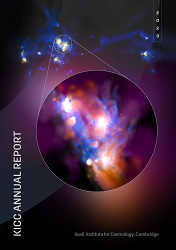The nature of dark matter remains one of the key mysteries of modern day science. However, more than 50 years after pioneering observations by Vera Rubin that indicated the existence of dark matter around galaxies, we are still in the dark about the nature of this unknown component of matter. The theoretical bounds for the dark matter particle mass remain staggering, spanning at least 90 orders of magnitude from 10−21eV to about that of a solar mass. In the last two decades direct detection experiments have made enormous strides in sensitivity and parameter space exploration. The complementary, indirect astrophysical observations, however, are indispensable laboratories of dark matter science as identified by both the STFC roadmap and the Snowmass 2021 process. The focus of this meeting will be to examine the status of rich and diverse fields of astrophysics to constrain the properties of dark matter, and to foster collaborative projects between theoretical and observational explorations of dark matter signatures in different environments – from large-scale structure to dark matter halos and the local Universe.
9:30 - 11:00 Block 1 (90min):
9:30-9:35: Welcome
Topic: Local Volume
9:35 - 10:15 Invited talk (30+10min) – Denis Erkal (Streams Invited Talk)
10:15 - 10:45 Highlight talk (25+5min) – Vasily Belokurov (Milky Way Highlight Talk)
10:45 - 11:00 Contributed talk (10+5min) – Sergio Martin-Alvarez (“Radiation and cosmic ray-magnetohydrodynamics to carve cores in dwarf galaxies”)
11:00 - 11:30 : Coffee break
11:30 - 13:00 Block 2 (90min):
Topic: Small-Scale Structure
11:30 - 11:45 Contributed talk (10+5min) – Sophie Koudmani (“Diverse Dark Matter Profiles in Dwarfs: AGN Feedback, Cosmic Rays and the Cusp-Core Enigma”)
11:45 - 12:00 Contributed talk (10+5min) – Boyuan Liu (“Effects of primordial black holes on early star formation”)
12:00 - 12:15 Contributed talk (10+5min) – Pranjal Ralegankar (“Dark matter minihalos from Primordial Magnetic Fields”)
12:15 - 12:30 Contributed talk (10+5min) – Mustafa Amin (“A lower bound on dark matter mass”)
12:30 - 13:00: DISCUSSION SESSION
13:00 - 14:00 : Lunch
14:00 - 15:30 Block 3 (90min):
Topic: New Physics beyond CDM
14:00 - 14:40 Invited talk (30+10min) – Francesca Chadha-Day (New Fundamental Physics through Astrophysical Observations Invited Talk)
14:40 - 14:55 Contributed talk (10+5min) – Will Handley (“The status of sub-GeV dark matter”)
14:55 - 15:10 Contributed talk (10+5min) – Tibor Dome (“Calibrating the halo model AxionHMcode to Cosmological Simulations of Mixed Fuzzy and Cold Dark Matter”)
15:10 - 15:25 Contributed talk (10+5min) – Julia Sisk-Reynes (“Astrophysical Black holes as a portal to probe axions”)
15:30 - 16:00: Coffee break
16:00 - 17:00 Block 4 (60min):
Topic: New Physics beyond CDM
16:00 - 16:15 Contributed talk (10+5min) – Vid Irsic (“The Nature of Dark Matter with the Lyman-alpha forest”)
16:15 - 16:30 Contributed talk (10+5min) - Eloy de Lera Acedo (“Dark matter studies at the Dark Ages with the Cosmocube 21-cm lunar mission”)
16:30-17:00: DISCUSSION SESSION



